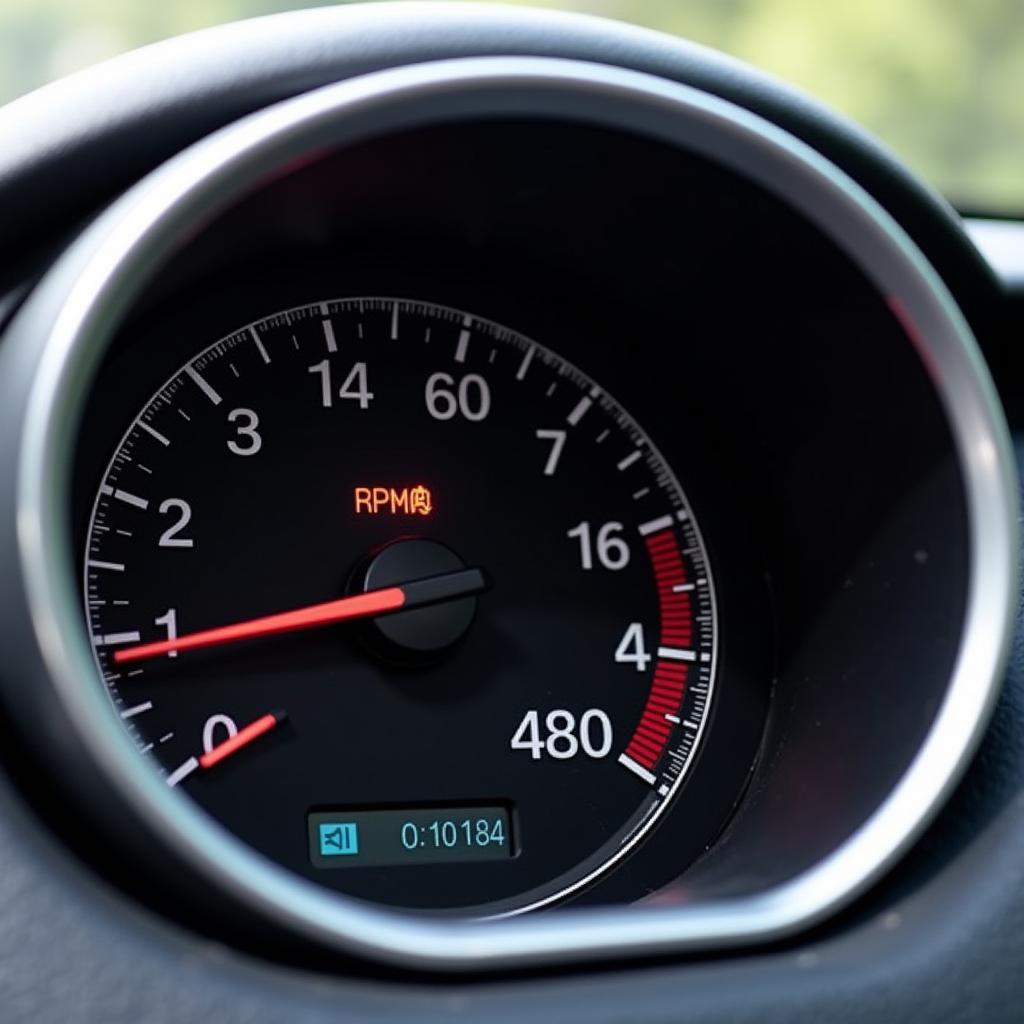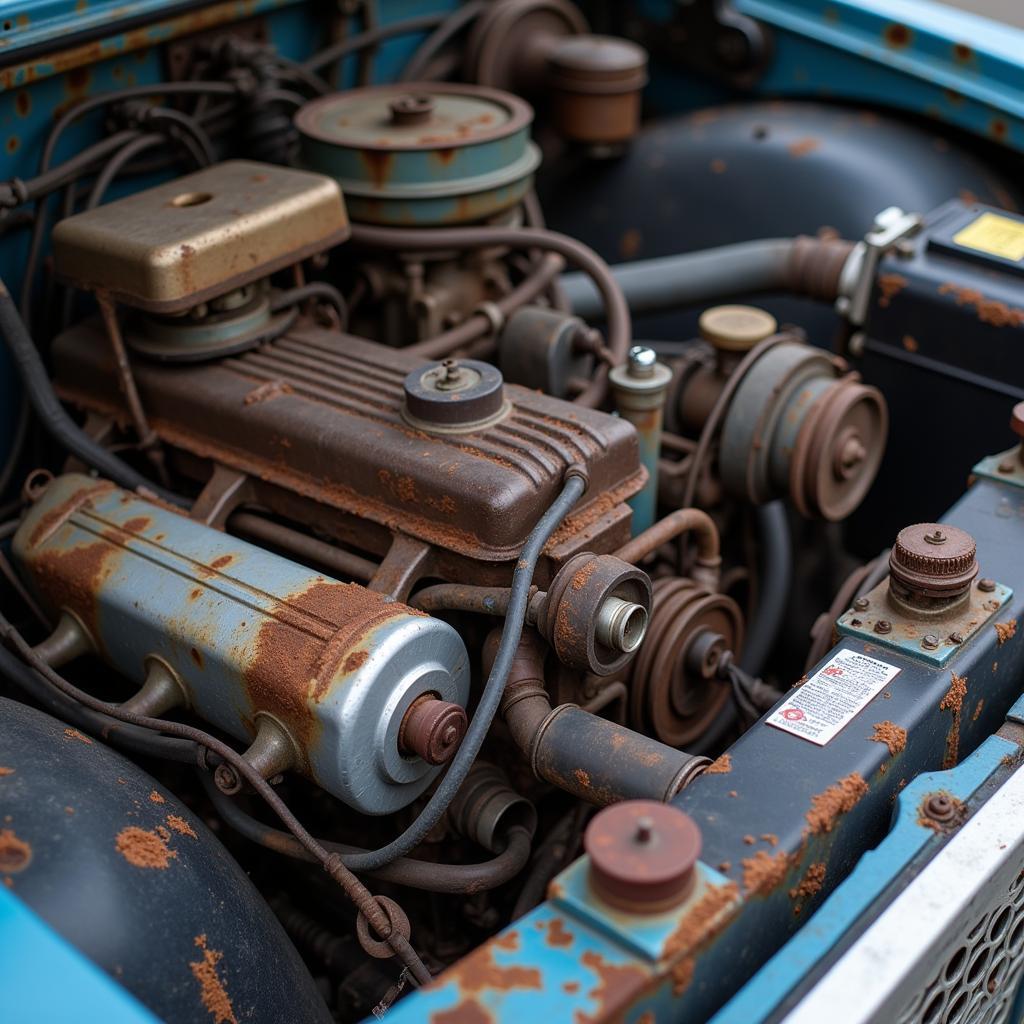If your car is having problems with RPMs going too high, you’re not alone. This is a common issue that can be caused by several different factors. Understanding the potential causes and solutions can save you time, money, and frustration. This article will guide you through troubleshooting this issue and provide helpful information to get your car back on track.
Understanding High RPM Issues
High RPMs, or revolutions per minute, refer to how fast your engine’s crankshaft is turning. While high RPMs are sometimes necessary for acceleration or high speeds, consistently high RPMs at lower speeds or while idling can indicate a problem. This can lead to decreased fuel efficiency, increased engine wear, and potential damage to your transmission.
Common Causes of High RPMs
Several factors can contribute to your car experiencing high RPMs. Some of the most common culprits include:
- Idle Air Control Valve (IAC Valve) Issues: The IAC valve regulates the amount of air entering the engine when idling. A faulty IAC valve can cause the engine to rev too high.
- Vacuum Leaks: A leak in the vacuum system can disrupt the air-fuel mixture, leading to high RPMs.
- Throttle Position Sensor (TPS) Malfunction: The TPS tells the engine control unit (ECU) how far the throttle is open. A faulty TPS can send incorrect signals, causing the engine to rev higher than necessary.
- Faulty Transmission: In automatic transmissions, issues with the torque converter or other components can cause the engine to rev high, especially when shifting gears.
- Cruise Control Problems: A malfunctioning cruise control system can cause the engine to maintain high RPMs, even after disengaging.
- Wiring Problems: Damaged or corroded wiring related to the engine control system can also lead to erratic RPM fluctuations.
 Car Dashboard Showing High RPMs
Car Dashboard Showing High RPMs
Troubleshooting High RPM Problems
Diagnosing the specific cause of high RPMs often requires some investigative work. Here’s a step-by-step guide to help you troubleshoot the issue:
- Check the Dashboard: Look for any warning lights, such as the check engine light, which can provide clues about the problem.
- Listen for Unusual Sounds: Pay attention to any hissing sounds, which could indicate a vacuum leak.
- Inspect the Vacuum Hoses: Visually inspect all vacuum hoses for cracks, leaks, or disconnections.
- Check the IAC Valve: If you suspect the IAC valve is the culprit, you can try cleaning it with a specialized cleaner.
- Test the TPS: Using a multimeter, you can test the TPS to ensure it’s sending the correct signals.
My Car Is Having Problems with RPMs Going Too High: When to Seek Professional Help
While some of these checks can be performed by car owners with basic mechanical knowledge, others require specialized tools and expertise. If you’re uncomfortable working on your car’s engine, it’s best to seek professional help. A qualified mechanic can diagnose the problem accurately and perform the necessary repairs.
Why is my car idling at high RPMs?
A high idle could be due to a faulty IAC valve, vacuum leaks, or issues with the throttle position sensor.
How do I fix high RPMs when accelerating?
This could be related to the transmission, throttle cable, or other engine components. A mechanic should diagnose this issue.
Can high RPMs damage my engine?
Yes, prolonged high RPMs can lead to increased engine wear, overheating, and potential damage to internal components.
“High RPM issues are often a symptom of a deeper problem,” explains automotive expert, Michael Stevenson. “Ignoring the issue can lead to more serious and costly repairs down the road.”
Conclusion
Addressing high RPM problems promptly is crucial for maintaining the health and longevity of your engine. By understanding the potential causes and following the troubleshooting steps outlined in this article, you can identify the issue and take the necessary action. If you’re unsure about any of the steps or if the problem persists, don’t hesitate to contact a qualified mechanic. Remember, “My Car Is Having Problems With Rpms Going Too High” is a common concern, and professional help is readily available. Contact AutoTipPro at +1 (641) 206-8880 or visit our office at 500 N St Mary’s St, San Antonio, TX 78205, United States.
“Regular maintenance is key to preventing many RPM-related issues,” adds Sarah Chen, a certified automotive technician. “Simple checks like inspecting vacuum hoses and cleaning the IAC valve can go a long way in preventing future problems.”
FAQ
- What is a normal RPM range for idling? Typically, a normal idle RPM is between 600 and 1000 RPM.
- Can a bad spark plug cause high RPMs? While unlikely to directly cause consistently high RPMs, faulty spark plugs can contribute to rough idling and other engine performance issues that might indirectly affect RPMs.
- How much does it cost to fix high RPMs? The cost depends on the underlying cause and can range from a simple cleaning to more extensive repairs.
- Is it safe to drive with high RPMs? It’s best to avoid driving with consistently high RPMs as it can cause further damage to your engine.
- Can a low transmission fluid level cause high RPMs? Yes, low transmission fluid can cause slipping and other issues that can lead to higher engine RPMs, especially in automatic transmissions.
- Can extreme temperatures affect RPMs? While temperature fluctuations can slightly affect idle speed, they generally don’t cause significantly high RPMs.
- Should I disconnect the battery to reset the ECU if I have high RPMs? Disconnecting the battery might temporarily reset the ECU, but it won’t fix the underlying mechanical issue causing the high RPMs. It’s best to address the root cause of the problem.






Leave a Reply